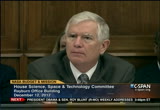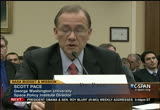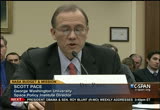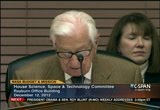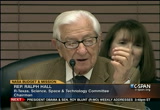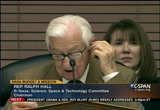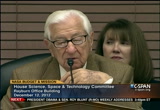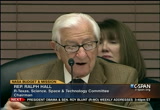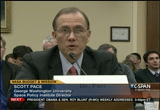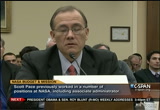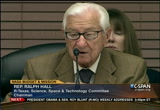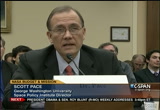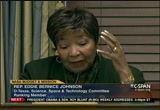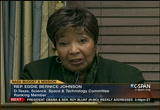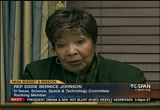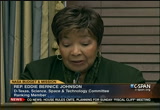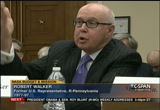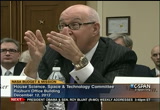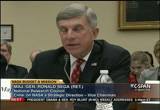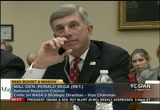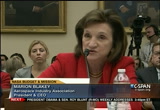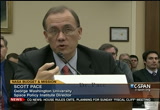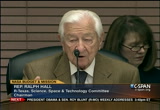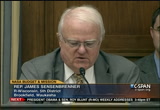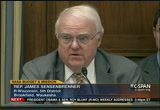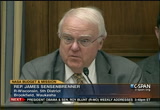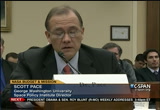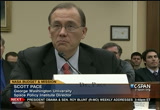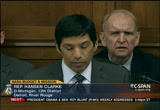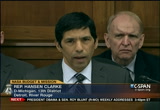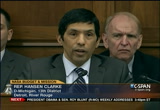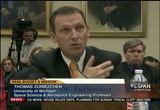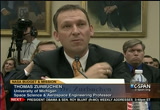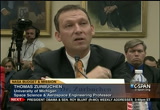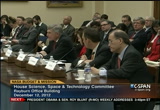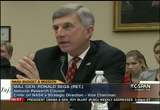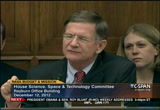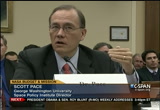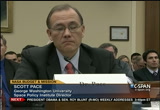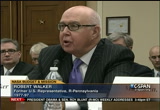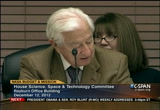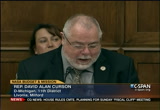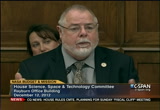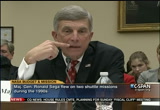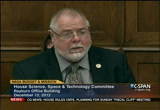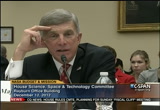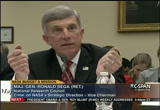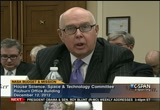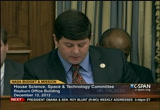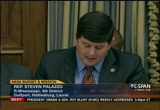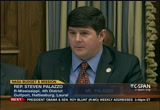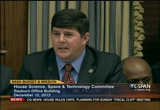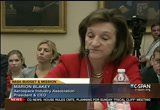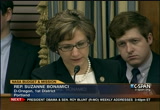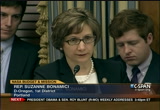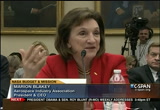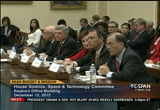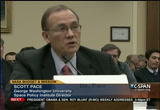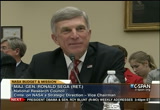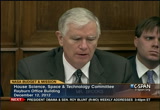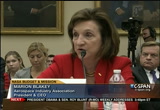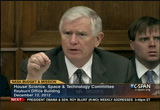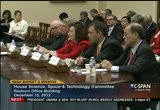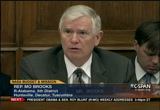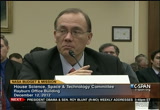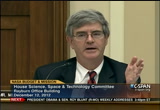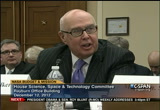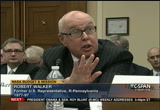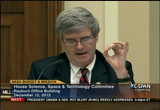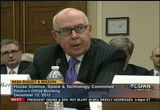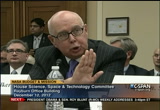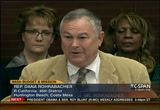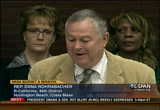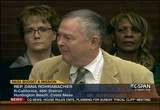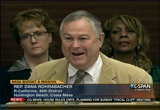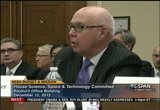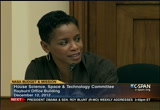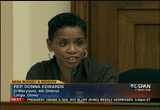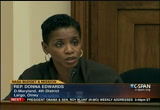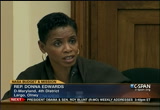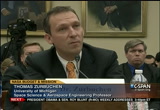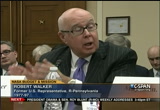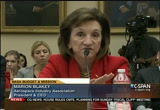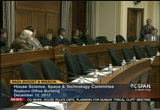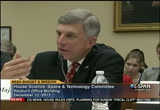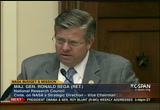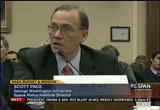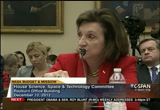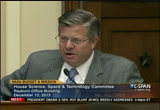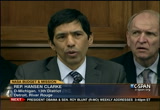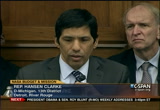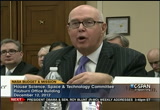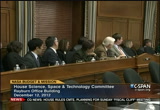tv Washington This Week CSPAN December 29, 2012 2:00pm-3:32pm EST
2:00 pm
opportunities lie in asia. taxation space agencies have shown a common interest in lunar missions as a logical next step -- asian space agencies have shown a common interest in lunar missions as a logical next step. and multinational program would be a practical means of creating a broader international framework. the geopolitical benefits could support more ambitious space explorations. europeans were interested in being part of a return to the moon. russia publicly supported this position. there are many commercial and
2:01 pm
educational objectives that can be achieved at the moon. the case for human a mission to astroid should be visionary the focus on practical applications. this is a reflect did -- reflection of the values we hold. it is not just our dna. it is our values. be our nation not defined by blood or religion but a conscious choice. in shaping the international environment for space activity, the u.s. should build a more prosperous world in which our values are taken beyond. we should also exercise some humility in facing the unknown.
2:02 pm
in their time these projects were controversial and criticized. who today would have said they should not have been done? we have seen these efforts to define us as a nation who pioneers the next frontier. we are all in this together, white house, congress, international partners and many u.s. companies that operate the capabilities. in think this committee for holding this hearing today. i will be happy to answer any questions you might have. >> thank you. i think all of you for your testimony. the committee limits questioning to five minutes for each of us. i will open a round of question.
2:03 pm
i do not ever like to say this is my last day. i do not anything last. i do not even like them to call an airport a terminal. i am thinking of the wonderful testimony you have given in the time it took you to get that ensued deliver it to us. it is great and generous. i glean from each of you that there is this need for more funds. they recommended $3 billion
2:04 pm
additional for nasa. this would not have even brought us up to 1% of the overall budget. three presidents turn their backs on us. things could be different today. you suggested several modifications. i have a question or so what reaction has your committee received with regard to the recommendations you lay out? you said a means to signing a consensus for nasa's future.
2:05 pm
2:06 pm
this in detail. we have to wait for their reaction. >> your testimony point out potential international partners confused by space goals and priorities to return to the moon without a viable alternative. ?hy don't you elaborate this seems to me the space station is number one. if we cannot do that we cannot do anything. we lose our international partners. we need more money. i think it is too late to ask for the addition that would help
2:07 pm
us that was suggested by a man that has ever been made. you will know whether or not the consensus is needed. it does nasa believe a consensus is needed? >> would you like to insurance -- answer the international or nasa question? >not being with nasa today, i think they do feel frustrated by the disconnect between the white house and congress. they would like to have some clear direction and support. if you ask them as representatives of the
2:08 pm
administration, i think they would say we have a direction and policy. we're trying to execute that as how.as howe know the policy is disconnected from technical and political reality. i agree with you that the space station is the most vital immediate thing we need to be focused on we have to be looking at what comes after the space station. this is where our partners feel a bit left out. mars and asturias are very challenging. when they look at themselves and their own agencies, and they do not see a way for meaningful operations. they are left without a way forward to work with us. international cooperation is
2:09 pm
essential to any exploration be on the world's orbits. no one thinks the will repeat the apollo program going there by ourselves. what can our international partners do? we have not really provided a hope for our partners in current policy. >> have you feel about putting focus on the space station but keeping in your open to going to mars and not to be asking for great amounts of money that it is going to take to do that until we perfect our reach in our own space station.
2:10 pm
>> if one does not support the space station well anything else is meaningless. the aftermath of the columbia accident we had very serious conversation with our international partners as to whether or not they wanted to stop and call it a day. they were very clear that we have to continue with the space station. it was not practical to talk about other international cooperation if we fail to at the station. i think the number one issue, utilization of the space station is the near term issue. insuring access to the station with higher reliability is a top issue.
2:11 pm
one of the concerns is on the sustainability of the station with the fragile logistic support. new commercial cargo capabilities are extremely critical and necessary. if there are any faltering and that, we will be looking at the potential for having to maybe reduce the manning on the space station. we will be looking at our utilization going out. >> my time is out. i recognize mrs. johnson for five minutes. >> let me thank each of the witnesses for extraordinary testimony. i am in a state of frustration. i think this committee is expected to be the visionary committee. i feel very strongly that our
2:12 pm
future and research development and innovation balm depends on .hat we do syria we are very mindful of the fact that we have very little money. with the help of experts we can at least lay out what we consider the vision for our country's research and innovation. and then allow the administration to determine what we can cannot do. currently there is so much frustration as soon where nasa is concerned that they do not know what is coming next. just looking at what has
2:13 pm
happened so far in space, where we are now keen almost exclusively from space exploration and research. i believe that to stop in decide we cannot afford it is saying to our future that we will not be there. we are just going to take a back seat and watch the rest of the world. we will not need to educate our young people i guess my question is how would you help us. -- how would you help us come to a real of recommendation that
2:14 pm
speaks to be need or future rather than just the money? we have got to make some real serious decisions. we have got to decide that we're going to invest in our future and eliminate the need for food stamps are whether we will continue to pay for more and more. i am very concerned i know we're very sensitive to the costs. we are not the appropriators. what ourking to see nation needs. i need to know if you give me some of your opinions on where you really think we ought to be
2:15 pm
if we were brave enough to say this is what we need, take it or leave it, mr. president. >> i agree with your premise. i think the role the government has to play in nasa is to ensure that its commissions are future oriented. i think we have spent an awful lot of money on operational issues. this committee could give us a sense of direction. you have to commit yourself to high-risk technology. you reduce the time it takes to go to mars. you do it.
2:16 pm
we can develop technologies along those lines. it will take the committee's decision to give nascent those kinds of instructions to move it forward. there are ways to reach out for some of the other things we are doing. since i left congress i've been involved with the ffrdc. they recommend that at least some of the nasa centers near to that kind of model. you can have both a government funding stream going into the operation as well as outside money coming in to do other things. that allows you to have some other streams of money that is not depend on the appropriations process. seems to me this committee could come up was someone along those lines. that allows you to look forward as well as find the resources
2:17 pm
necessary. that is what i'm trying to suggest. think that is possible. i've worked with these companies looking to do exciting things. they would love to have nasa as a partner. you have to find out a way to find the ways for nasa to be able to do that partnership on a very routine basis. >> i know my time has expired. >> our study task stated that any recommendations will be predicated on the assumption that the nasa budget will be restrained. we look at a budget constrained environment. we do believe we concur with what you're saying in terms of
2:18 pm
the long term view. objectives are starting points. there is a consensus about those goals and objectives. as we had any witnesses and did our work, we found little erroids areat astrid's little excepted. it is important. it is important there is clarity in terms of the direction. the plan can identify what the trades are in that portfolio going forward. there is a starting point upon which some choices can be made. >> i think you will find
2:19 pm
industry joining. there is the ability to bring together the public and private sector international. it is certainly an excellent step in the right direction. there the upcoming reauthorization process, it is not so far away that you will have to attack kelltackle it. there are conflicting views about this. let's keep in mind that building the capabilities to get into deep space, the ability both in terms of heavy launch as well as microcapsules and tackling some of the research. we do not have all the answers are in deep space radiation and bone density. this critical research has to be continued. when they supported the rockets in the 50's they did not know
2:20 pm
where they were going to go in and made all the difference. >> this provides hands-on experience. it is the crucial thing to give them a sense of the future. when they say we have been to the moon already have to say my father's generation went to the moon. we have not. that generation is passed. queenie to real be -- rebuild people. there is this opportunity to provide opportunity for real hardware in flight experience
2:21 pm
for which there is no substitute. the building of capabilities, none of that is possible without hands-on expertise. i thought my colleague really nailed that one. >> the gentle lady yield back her time. i think that was a very good question that he asked. i am sorry that was not put to the president of the united states before. the funds we need it and were requested were turned down. this time i recognize mr. simpson for five minutes. >> nasa was created in reaction
2:22 pm
to the launching of sputnik 1. nasa is focused on putting humans into space on arguably the most exciting facet of the agency. mission oriented space programs have been the prism through which we judge the agency. mission orientation excited a group students to go in to stem education and got as a generation of scientists and engineers. the space shuttle flew its last mission in 2011. we rely on the russian space agency. the bush administration began the program to serve as the shuttle's success are. president obama -- successor but
2:23 pm
president obama closed the program. congress has continued to see the importance of the system in mandated the space system in the zero ryan program. i appreciate your comments that the stimulus act appropriated moribund in 1 act in this country has spent on nasa since its creation. budget in spending are an example of priorities. in terms of having to continue the united states preeminence, not just in the space program but in terms of science and everything else that goes along, it ended up being washed away in stimulus funds. as this hearing has highlighted, the approach to this lacks clear
2:24 pm
mission. he is relying on the success of commercial space. i strongly support a public /private partnership for our space policy. it is up to now said to develop the heavy lift rocket because the private sector does the not have enough funds to do it by itself. that rocket means a net to overcome the administration's shortsightedness. they supported a mission to the moon. president obama has taken a been there done that approach. we have not been there for 40 years. the partners would have helped us. they have never been there. this will fill the void be left behind. that will have a trickle down of
2:25 pm
that on the number of people that we train as scientists and engineers to keep america's pre- eminence in practically everything else. would you please discuss the problems caused by the cancellation of the program and what is needed from congress in this current fiscal environment to insure the success of the space launch system? >> thank you. that is a tall order. one of the cruel things it was supposed to do was provide a transition for the work force. >> we have lost that. >> we have lost that. the deep integration between lower orbit and farther destinations that were hoped for is now gone. 2012 is not to thousand eight.
2:26 pm
we are in a new situation today if -- is not 2008. we are in a new situation today. increasing risk to the international space station. while we hope for and want to see the private sector take over that work, if there are delays or problems we do not have a fallback option. we are down to a few critical paths. the complementary nature eyespots was one of its strengths. the lack of a clear rationale for human exploration be on the international space station is another serious problem. the approach of being capability driven also has a lot of
2:27 pm
vulnerabilities. i think a more strictly geopolitical approach such as a post-cold war approach would be a better approach for the united states. there are others that one could take. talking about capabilities is absent a strategic rationale. i think that is a very fraught path. >> thank you. my time is now expired. >> thank you. funding for nasa is very important for many reasons, but it creates jobs. we have got to speed up our nation's economic recovery.
2:28 pm
i have a couple of bills i believe provide a very cost- effective way to strengthen our economic competitiveness. that would be to invest in the city that symbolizes bow at the u.s. many urge both the u.s. manufacturing and assets to help -- both u.s. manufacturing in the assets to help our economy grow stronger. it is facing its own fiscal cliff. i will soon be introducing a bill that will allow the city to refinance its considerable debt at a lower interest rate, saving it. furthermore, i am proposing eliminating capital gains taxes on investment. it is a way to spur investment. saying that, in the city of
2:29 pm
jewish right we have an extraordinarily high number of people who have lost hope because they are not working. they're out the metropolitan region -- throughout the metropolitan region we have thousands of job better going unfilled because they cannot find people qualified to be hired into those jobs. we have a skills gap in detroit as well as in this country. i know you understand these economic challenges we are facing. how you feel investing in assets innovation would help us close that gap? >> i in the first university
2:30 pm
graduate in my family. the only reason i studied science and came to this country because the commitments this committee has made. i believe that power of investments that come from these have a tremendous effect on the youth on the young high school student who is making decisions for her career and the future that she has in front of her. i do believe the inspiration aspect of nasa is an important part. once we get them through the high schools and universities, i believe the defers portfolio explains to our students that
2:31 pm
technology and progress talks about ideas. something like 5000 students in entrepreneurial activities, aerospace is the third most common theme. they have mentioned the tremendous power of the ability of putting these companies out there trying to have new approaches of lansing while we are on mars. i believe the hands-on experience are a second aspect
2:32 pm
in a very important solution that you were mentioning. the jobs are coming. some of the surprisingly changes from technology is developed on the auspices. they are investigating sewer systems using robotics technology that was involved in nasa. general motors is having a tremendous economy lesson learned in collaboration with nasa through these public/private partnerships. i believe there are multi pronged aspects that lead directly to the top line to what our economy does. >> thank you. do you have time for another question? >> i beg your pardon?
2:33 pm
>> i yield back my time. >> the committee recognizes chairman smith. >> let me address my first question to you. it shows there is not much supports and the scientific and space committee for a near- earth astroid in 2025. is this helpful in getting us to mars? are there alternative missions that can replace that mission? >> there's a mission to an asteroid that is in the 2010 national space policy of the
2:34 pm
u.s. in addition to not having been widely accepted, there were some shortcomings noted. as we look back in time, and there have been several presidents that have talked about mars. the rhetoric toward that was noted by the committee. there are different paths that one could go if that was the chosen destination for a human mission. it will maybe look at integrating some of the other aspects of nasa's work. for example, if that was the strategic goal then you will look at the robotic missions that would support going there.
2:35 pm
>> the do you think we should reconsider that mission to the near-earth asteroid? >> the committee did not address that directly. there are many questionquestion. it could be focused on the strategic goals. >> thank you. what do you think the american people would like for us to do in ? the hubble is popular with curiosity. more specifically, how do you determine that coincidence between popular support in missions that are scientifically justified in missions that can be justified by budget
2:36 pm
constraints as well/ ? >> u.s. public opinions have been remarkably stable for space activity. it was never as large as people thought it was during the apollo. it has never been a low as people thought about after. the american public has a sense that we are and exploring, pioneering in nation. and they assume that our leadership is working on that. they trust that is happening. when things like the shuttle program ended without a clear path after, there was somewhat of a sense of shock and concern. not because they agree or preferred one pack or another but because they sensed, isn't someone working on this? getting too specific missions, i think we see over and over people having an interest in
2:37 pm
people. when there is the possibility of organic life on mars ec lot of interest. much to the disappointment of the geologist who think they are doing important work. space tourism, said the sense of personal communication -- participation. >> would you put in that category earth like planets? >> absolutely. the number of earth like planet has been very exciting. with the james space telescope mirrors seen things we have never seen before. it will inspire that sense of wonder that the american people assumed their country is going to be a leader. >> how do we determine the balance between robotic and human missions?
2:38 pm
there are advantages and disadvantages to both. >> clearly there needs to be an understanding of what humans can do best and what robots can do best. robots give us tremendous amount of information. in general, if they find what we sent them there to find. it is based upon our belief of what they might be capable of finding. humans have the advantage of going and finding things that we never expected. someone said the other day that the two small rovers that were on mars for many months did in the whole time that they were there about the same amount of work that one human could do any day and a half.
2:39 pm
it is the human ability to process information in remarkable ways that is needed. you do strike a balance. the precursor missions will always be a robot id. there are tremendous science missions you can do with robots. in the and you want to but humans into a place where humans can find only those things. >> thank you. >> i am aware of mr. walker's problem space and time wise. we excuse you. >> i am fine. i have my office tell my appointment that i will reschedule it. thank you. >> thank you. the chairman now recognizes the gentleman from michigan. >> thank you. thanks to all of you who testified on this excellent
2:40 pm
testimony. i am from an industry that has been affected -- benefited much from nasa and the technologies and everything that they have spawned from their research. i come from the automobile industry, everything from metals to paint to waieight. i help nasa gets a long-term presence that they are looking for. it but it's this entire country. -- benefits this entire country. had not been for the stimulus we might not be able to talk about any funding. with that, i would like to direct a question to general. you testified that nasa needs personal flexibility including the ability to hire contracts
2:41 pm
rather than civil servants. i would like to know if this is because there is not a long- term commitment to the program. or if you believe even if there is a long-term commitment that would be your strategy of personnel? what provisions can nasa make for the retraining of missions if you end up with those people? is the commercial markets long -- large enough to absorb these highly skilled people this could ? could the market absorb those? >> as we looked one of our
2:42 pm
organization was to identify the effectiveness of the mission activity. that is how we address that. as you are right at strategic objectives and goals and nastic create a strategic plan to accomplish those, we recommend the flexibility, not necessarily how it would turn out on the ability for infrastructure alliance with the strategic goals and electives. we did note that the jet propulsion lab is a structure. there are folks they're engaged in many aspects of research and development and operations.
2:43 pm
different centers have a different mix in terms of contractors and civil servants. there were about four of them. they were about. about three of them were quite high. there is one of higher than contractors. it was more about the flexibility of doing what the center would be expected to accomplish. >> happen only assure that nasa's facilities are not
2:44 pm
acquired by foreign interests that may be harmful to our national interest? >> that was not addressed in our study. >> you testified in your written statements that nasa's infrastructure flexibility and to dispose of property would this be included in foreign countries ta? >> i do not recall that we specify in our deliberations the nature of the potential facility.
2:45 pm
a great facility. some of nasa's missions need that. it also has the capacity for other work. issa have looked at doing some of the work in that facility. they were also discussing the facts -- t ofhe space acts -- the space acts. some may be inappropriate for a sale. others may be greater utilization in more creative ways. >> thank you. you talked about the possibility for-profit
2:46 pm
companies. we all know there are great minds out there thinking about farming in space and mining in space. are there really companies that can join in with nasa to help nasa become a viable program? >> absolutely. you do have working relations. we would like relations at work toward the future. we announced to a company that is looking to go to the moon. the expertise in that area would be invaluable. they are prepared to pay nasa for utilization of their facilities. there are lots of opportunities out there that can be expanded even more into the future.
2:47 pm
you mentioned the automobile industry. they are in the process of building in autonomous vehicles. no one has done as much work on an autonomous vehicles than nasa. these are partnerships that could be expanding. >> i yield any time i have left. >> the chairman recognizes the gentleman from mississippi. >> this was especially appropriate considering the reauthorization. this is already been expressed. i came concerned with the vision going forward for causing such grief. what are our long-term goals for nasa? how we form a strategy that takes into account all nasa
2:48 pm
initiatives to stem education? we are discussing some of the past nasa can take. none of them will be easy. our job become more difficult as budgets are shrinking. they will do a better job of informing the american people of the important job nasa does. this is worth investing it. we must not forget that this is an investment in research and future technology. nasa has a proven record and thousands of examples we cannot live without in 2012. i would like to remind everyone the speech president kennedy gave in 1962. he addressed the effort to put the man on the moon and use the
2:49 pm
famous line "we did these things not because they are easy but because they are hard." the questions we must answer are anything but easy. we shall not shrink back simply because their heart. nasa must set up to this challenge. this is not now come anyone in this room wants to see happen. i believe i may have time for one question. given the end of this shuttle program how does the uncertainty threaten our industrial base? >> certainly. this was extremely disruptive.
2:50 pm
they have contractors working down there. all of those people skills go elsewhere. it may very well go into other industries. we are extremely concerned that there be the kind of stability and long-term programs and ones that really do tap the outer edge of design talent. it was behind the many universities that are all combining support. >> had be replaced that lost talent? will not be a gap?
2:51 pm
>> we are quite worried about that. as much as we support these programs be still have to have the opportunities and young people to see in front of them. if these opportunities are not clear, they will definitely go elsewhere. we do not see the kind of upsurge we should. it is a problem. we have a huge amount of required -- retirees in the industry. >> thank you. i do have a couple more questions but i will yield that
2:52 pm
my time. i do agree with our colleagues from detroit. i am all in favor of limiting the capital gains tax for every american. thank you. >> the chair now recognizes the chair person from oregon for five minutes. >> thank you for all of the witnesses for your testimony. i'm going to follow up on discussion we have already been having about education, especially s.t.e.m. education and the importance of educating the public about the benefits of the space program. there has been some testimony that begins to touch on this. you talk about how space programs have improved our lives from vaccinations research to weather satellites.
2:53 pm
you talk about how do we define the purpose and meaning behind exploration of space within a society that is not always see tangible benefits. you say and this will be especially challenging unless there is a clear rationale linking such efforts that can be supported in a bipartisan manner. there is some discussion about the skills gap and s.t.e.m. education and the role of nasa and promoting s.t.e.m. should be marked strategically articulated. what is the industry doing to convey to the public the
2:54 pm
benefits of space exploration? how can the contributions of our space program be communicated not just to stakeholders but also to the public? >> thank you for the opportunity to expand on that a bit. we did put a great deal of effort into this brand new report called space in our world. we will make certain that every member of this congress has a copy. you are all ambassadors. we also look at the factors social media this could be accessible to every american. we have been putting out nuggets of examples. we have been looking to young people. there are examples of a variety of universities and in private
2:55 pm
sector where they have kicked off enormous benefits. i cannot believe the public has any idea how in their daily lives they are over and over again using the words that come out of our nasa programs including nro. it almost out eventually into the economy. it has been a huge benefit for our economy. >> does anyone want to add to that? >> i would say from the experience of being at the university i teach both graduate and undergraduate students. many courses in space and space quality you are not space enthusiasts. to me it is always a very
2:56 pm
gratifying as they hear about the relationship of space to the economy. just how critical they realize the subject is. many will say they walked outside and they have a new perspective on the sky above them. they had no idea that all these things were going on overhead, gps systems, communications satellites. how deeply space is imbedded into the critical infrastructure. it takes on a new appreciation. and how the clinton administration used bring the russians into the space station.
2:57 pm
the centrality is something students come to know and appreciate. it happens over and over again as soon as it plays out for them. >> thank you. i have a few seconds left. >> our committee did look at that as well. nasa is taking some very positive steps with regard to social media and their s.t.e.m. programs. one was a young boy in ohio during the apollo program's. in our study we looked at events
2:58 pm
that are clear and compelling. the communications to the public was outstanding. in identifying the clear objectives and goals and identifying a strategic plan for nasa, at the story becomes clearer and easier to tell. >> thank you. the gentle lady yelled at her time. >> your testimony highlights the importance of maintaining the pipeline of engineers to make sure we innovate in the future with respect to both of you. what are your recommendations for a program that provides opportunities to our graduate and post-doctoral students?
2:59 pm
>> thank you so much. my personal feeling is that such a program will be advantageous for this nation and could enable ideas that we're talking about on this panel. we have tremendous interest to really engage in this. such a program will be very positively reacted upon. >> i have had the opportunity to go to almost all of nasa's centers around the country. i have been very impressed with the degree to which local university talent is integrated into many of the nasa programs. there's practically no one under 30 as to go around the entire facility. there is a bake effort in trying
3:00 pm
to pull in young people. one is seven minutes of terror. it has relatively young engineers talking about the seven minutes when they did not know what the curiosity rover was on mars. the other is a very funny rap video done by young people and how exciting it is to be involved in the space program. there is a lot going on. >> do you have any specific suggestions of what the federal government should be doing to encourage stem education at the collegiate level, or postgraduate level? >> my personal recommendation
3:01 pm
would be to focus on these modest and small-scale programs with a tremendous emphasis, and make sure that suborbital programs and programs to support small scale missions as well as explore programs are funded at the level that really makes a substantial impact towards talent development. in my opinion, there is no other investment at the collegiate level that will have more impact than hands on experience and development of talent for industry and for nasa. >> i also would say that you see a great deal of emphasis now in industry on paring with universities on specifically focused programs that involve research for undergraduates that can take them all the way into the graduate level with
3:02 pm
internships. and going back into the university where the curriculum is tailored to become a professional with a high degree of expertise in one or another of these specialities. there is a lot more that is no longer generalize, but is going into engineering schools and saying, let us help you teach so the people come out with very concrete interests and ambitions at the end. >> congressman walker, general sega and doctor pace, legislation has been introduced as a way to help stabilize nasa's strategic direction testimony we have heard makes it clear that the largest problem is not at the nassau level, it is nasa level. but a longer term for the nasa administrator have a positive
3:03 pm
effect on nasa? >> i think separating the nasa administrator from the political structure would be a mistake. i think that that kind of a situation would keep nasa out of the mainstream of were political thought is going. i do not think that would be the wise course. >> our community did not address it. >> do you have a judgment? >> i do not. i have not thought through. >> dr. pace? clerks i think a slightly longer term or a set term could be useful, -- >> i think a slightly longer term or set term could be useful.
3:04 pm
the longer>> thank you, mr. cha. it has been a real pleasure. >> it might be one thing the house and senate could agree on. [laughter] i recognize mr. miller, the gentleman from north carolina. >> mr. pace, that answer would also qualify you to be a lawyer. congressman walker, i was oferested in york idyour idea corporate sponsorships. i cannot quite imagine that
3:05 pm
picture of neil armstrong are ed white walking in space in spacesuits that made them look like nascar drivers. a part of me rebels added in the first place, but second, i worry about the stability of the funding. we heard a lot about the need for stable funding and leadership today at nasa. corporations merge, they get a car, the run into trouble, they have to scale back. well sponsorships be a stable source of funding? >> there is instability now, but the appropriations process has been a very unstable source of funding for nasa as well. this is one way of reaching out to bring additional resources into nasa.
3:06 pm
these are industries that then take a huge interest and nasa's activities, people who provide sponsorships then billed out. we have been talking about the need for nasa -- build out. we've been talking about the need for nasa to be broadly recognized in the community. this is an opportunity for us to have an outreach that goes to people who then have some skin in the game. i think it could be an extremely important way of bringing other resources into an agency that is badly in need of significant
3:07 pm
resources for the future. >> i was not picking a fight with nascar. let me make that clear. i want to be able to go out in public. [laughter] there has been a lot of discussion of public-private partnerships. we do need to think about commercial applications. but, i worry. we've had proposal discussions of privatizing the national weather service, which is entirely built with taxpayer funded research. it is a capability that has been entirely provided as a public service, built by taxpayer funding. proposals seem to be coming from a company that wanted to by the national weather service. have monopoly power, and so the
3:08 pm
data for a profit. since there is not an active market in national weather services, pricing it seems to be kind of hard. the problem of having that information provided for profit by somebody with monopoly power worries me. it strikes me as what happened with the sale of state ies inrises and companiy the soviet union. how do we make sure we are not taken in these public-private partnerships and are not giving a monopoly power for something that perhaps should be provided as a government service? >> one of the problems we have with the weather service right now is the fact that they have not been able to fly their new modern satellites. we risk a lot of the label information going forward because the government has not
3:09 pm
been capable of moving forward. -- delay of information going forward because the government has not been capable of moving forward. there are a number of ways that you can write bills to ensure that kind of activity, as i mentioned before, you can do it through a mechanism where the federal government remains actively involved in how these companies are doing their job, and provides an annual stream of funding. there are ways of structuring this that would assure the public interest is still maintained. >> the chair recognizes the
3:10 pm
gentleman from california, mr. rabat. >> let me echo the gratitude that i have for having served with you. it has been an honor working with you. and those who will be leaving us as well. from our last question, let us know that we have $1 trillion that we are spending more than we're taking in. one-third of the federal budget now is that. we are increasing in debt. if we're going to do thing -- now is debt. we are increasing in debt. we have got to be creative. we've got to find new approaches. that is the number one
3:11 pm
commitment we have got. otherwise, it will fall apart. when you have $1 trillion more in debt that you have to deal with, i do not believe the american people are going to put nasa and the top of their priority list, which means we have to be even more creative for those of us who do believe in the portents of space related assets. for the hearing today, we already talked about how this infrastructure that we depend upon -- and remember when telephone calls cost so much money -- it is a space-based assets that have brought that down. people have no idea the potential, even future potential of gps. we're just now experiencing that. these are all things that deal with space-based assets. i believe that nasa should be
3:12 pm
the one that is pushing the envelope on what space-based assets will benefit humankind in the future. one thing that is sure, if we are to have space-based assets, we have got to have environment in space that is capable to use. today, that is under threat. if there is anything i can see that nasa and irresponsibility for along with a global partnership and lead the way -- responsibility for all along with a global partnership and lead the way, it is that we debris from space. we have not really focused on that. maybe that is one of those challenges the young people and everyone else can understand.
3:13 pm
the other challenge, i do not know if anybody noticed -- i do not know if i have the actual number -- did anyone notice, 2012xe54? that happened to of been an asteroid that was discovered sunday, and yesterday flow between the earth and moon. -- flew between the erath and arth and moon. that had the same destructive power as the asteroid that destroyed hundreds of miles of siberia about 100 years ago. yet we did not discover it until sunday. those are huge challenges that we need to take up. we're not going to have space- based assets unless we clear the
3:14 pm
debris. and will not have a safe plant unless we can deflect -- detect, and deflect these types of challenges. -- we will not have a safe planet unless we can detect, and deflect these types of challenges. above the 45 seconds to comment. -- you have got 45 seconds to comment on my pontificate and. >> -- pontification. >> space debris is a crucial issue. the commercial industry is facing all sorts of problems with monitoring that. much of what we monitor is larger than some of the particles that could actually cause the real damage in space. that is a real problem that needs to be addressed. there are some people out there in the private sector that have
3:15 pm
some interesting ideas about how we could do that. >> as our committee looked at the issue of asteroids, i commented on the human mission to them. also recognizing the importance of increasing our understanding of the asteroids. currently there is a satellite that is in that area. >> okay, thank you very much. crux the gentleman yields back. -- the gentleman yields back. the chair recognizes mrs. edward from maryland. >> i want to echo how delightful it has been to have you as our chairman for the past couple of years. i have enjoyed your company and your service on the committee. i think you for that, and for tolerating meet occasionally. -- me occasionally.
3:16 pm
i am a twitter follower of nasa 's. nasa has 2.3 million followers. it is not insignificant. it is more than the first lady and r g three and nascar. -- rgiii and nascar. how we can capture that so it also translate into support on a fiscal level is the challenge, the range of activity that we expect of the agency. over this next couple of hours or so, as i am following my twitter feeds, i noted that nasa assures us that the world is not going to end on december 21. #curiosity was the fifth most
3:17 pm
hashtag over this pastst year year. when i was growing up, our embrace of the agency was because of the apollo missions. did was sitting in kindergarten and first grade and whenever those other grades and watching of the liftoff. that inspired a generation and a nation. administrator blakey, you pointed out that it requires that kind of public inspiration in order for us to generate work with the agency does. -- that the agency does.
3:18 pm
one of the things i would like to look at, especially where science is concerned, is that the difficulty the agency has in doing science and a year by year basis -- it really does not make any sense. it is not what you generally find in university and other kind of research, were you know as an investigator and where you are starting, what your resources are over it. of time, and then you can plan out the investigation -- over a period of time, and when you can plan out the investigation. in fact, you have instruments that surround the are not supposed to be sitting here because they're supposed to be up there. and then you end up over a course of time spending a lot more money. i wonder if i could hear from any of you about the idea with respect to scientific and
3:19 pm
funding, just for these programs, understanding that it is different than funding other kinds of things that the government does. i wonder if you have some comments about that. >> i have currently eight phd students who are supported. i know firsthand the difficulty of managing these young people's lives in an environment in which decisions can happen on a week to week basis. once we lose a ph.d. student, we will do what ever we can as a university to cover that ph.d. student. especially in areas where space interact with biology in the past, where we lost --
3:20 pm
>> we lost something like 30 in our university alone, 30 phd students that never came back. will the creates stability in that regard, that would be in fashion from people like me and others. >> congressman walker, could you comment. you have been on this place. on an idea like that and where we might be able to take it. >> i have long believed we do great damage to our science programs with annual appropriations process. you do have to have a long-term outlook when you are doing science, whether it is space science or [indiscernible] science. we have to often scrubbed the authorization process and favor the appropriations process. one of the great reforms around this place that would work would
3:21 pm
be to actually enforce the rules of congress that says you have to have authorization and the place before you can pass appropriations. we need to have the stability of long-term set policy to do science well. by abandoning authorization process too often, we have put the policy decisions in the hands of the appropriators and they have a one-year horizon. one year horizons do not work in science. >> thank you. >> there is a precedent for this in terms of some defense programs. the industry would like -- in terms of complex develops programs. when you look at those in the dod arena, it has been an excellent force.
3:22 pm
>> the chair recognizes the senator from illinois. >> thank you very much. your workers chairman, it has been a good couple of years. wish i could stay longer. i have enjoyed seeing you each time at committee. it reminds me of my father who says it is better to be seen and reviewed. i appreciate all you have done for us and our committee. i also want to agree with my friend and colleague that we have got to start thinking more long term when it comes to nasa and science. i think it puts us at a
3:23 pm
disadvantage to so many other nations that are thinking five, 10, 20 years into the future. a continuing revolution. we have to change that and make sure that happens. thank you for being here. this is such an important discussion. general sega, would the nrc have had the same conclusions and president obama had not cancel the consolation program for years ago? >> the factors that brought us to appoint a talked-about in terms of transition was also the -- terminating the subtle
3:24 pm
program -- shuttle program. the ability to have a consensus on strategic objectives and goals. this locker term thinking is important. to be able to have a long term, clearly it crosses administrations. the study was prompted by -- prompted to nasa and the nrc. the issue of the longer-term piece, i think that would be an enduring theme, regardless of other events. >> dr. pace, if you would not mind your thoughts on how these conclusions would be different if the program had not been cancelled.
3:25 pm
>> i think there are two parts to the disruption that occurred. one is the consolation program itself impact. we would have maybe a slightly different tenor of the program had not been cancelled. but the deeper problem really is the policy. the national space policy in 2010 is quite a good document. it is very balanced. there is a lot of good material. the part that sticks out for me is the section on civil space exploration. the asteroid and mars aspect of it. which to my mind really comes out of left field. it did not have an international context, a commercial context. it was not my fault of industrial base realities. it is distinct from the rest of the policies. i think if that mistake had not been made, you could have had a
3:26 pm
more rational discussion about how they could moderate, changed the program into it with the with an acceptable to the administration going for. it is really policy choices that are at the root of the issue. what is the strategy you are following? the problematic outcomes and budgetary outcomes follow from that. that is where i would lay the blame. >> i would ask the other members if you have any thoughts on that. >> the variables the companies have had to deal with had been difficult. we feel strongly moving toward that it is important to maintain both the instances on commercial resupply. be have to keep that on track. and have the ability to get too deep space. those two things are parallel tracks and are both very important.
3:27 pm
>> i would, at that at ticket has to be recognized that financially -- i would comment that i think it has to be recognized financially. you have to look at it in terms of where would we be in terms of those costs undercutting other nasa programs if it had not gotten the kind of money the chairman referred to earlier. of course it would be done if he gave nasa an additional $3 billion. >> thank you offer being here. these are pork and discussions. i hope as we can continue those and have a great vision for nasa in the future. thank you for ali in, chairman, for us. i appreciate your service so much. >> thank you.
3:28 pm
you have my assurance that we will work together. my undertaker says do not worry about it. if you do not like flowers, that will finally grow on you. i think mr. clarke has asked for recognition. >> thank you, mr. chairman. i wanted to ask everyone for their comment on how nasa long- term strategically can work more effectively with the private industry. one area was technology transfer on how the transfer of nasa's research private agency to federal agencies could play a larger role in our strategic division.
3:29 pm
the other issue is how we can best restructure nasa in a way that would likely need congressional authorization. these are issues that for raised by chairman walker with the sponsorship of one of our missions. although i prefer -- would be more appropriate. congressional authorization needed to restructure, to promote the restructuring that could lead to more effective private partnerships and how do we strengthen the role of technology transfer? >> i will give you one. there are a number of ways you could do this. the aldridge commission
3:30 pm
recommended centers be turned into ffrdc like areas. they would be structured in a way that would allow them to receive both public money in private money into their operations. i think something like that is one of the places it has to look. one of the things the nrc said was the alternative might have to be the closing of some of the centers. or that the reduction of the size of nasa, this is taken look at how you keep the center's in place i think this committee needs to look at how you might restructure them in a way that allows them to attract private
3:31 pm
and public money. >> mr. chip -- chair, i wanted to thank ranking member johnson for steadfast leadership. chairman hall, you are a true gentleman in every respect in how you govern this committee in a fair and balanced way. it has been an honor to serve with you and all of you. thank you so much. >> thank you. i agree with you completely. you are a gentleman. thank you. the chair recognizes dr. harris. >> thank you very much. i want to thank the panel for being here to review the strategy is going forward. i will ask for comment on a very particular aspect.
3:32 pm
it leads off what german walker said. there is important input from manned missions. a lot of the critical things we're doing i work it into the operating room. the robotic surgery we are doing, you could do from around the world. you could have the surgeon city from around the world from where that machine is actually performing an intricate operation. operation.
158 Views
IN COLLECTIONS
CSPAN Television Archive
Television Archive  Television Archive News Search Service
Television Archive News Search Service 
Uploaded by TV Archive on

 Live Music Archive
Live Music Archive Librivox Free Audio
Librivox Free Audio Metropolitan Museum
Metropolitan Museum Cleveland Museum of Art
Cleveland Museum of Art Internet Arcade
Internet Arcade Console Living Room
Console Living Room Books to Borrow
Books to Borrow Open Library
Open Library TV News
TV News Understanding 9/11
Understanding 9/11